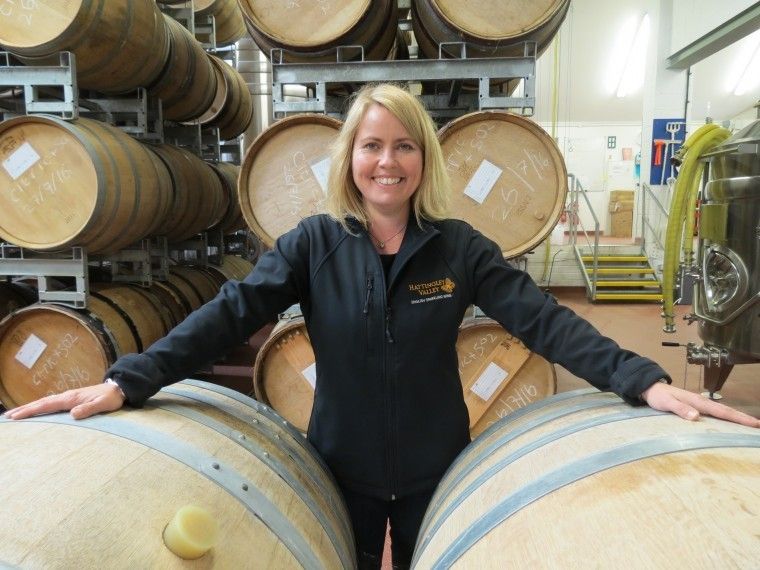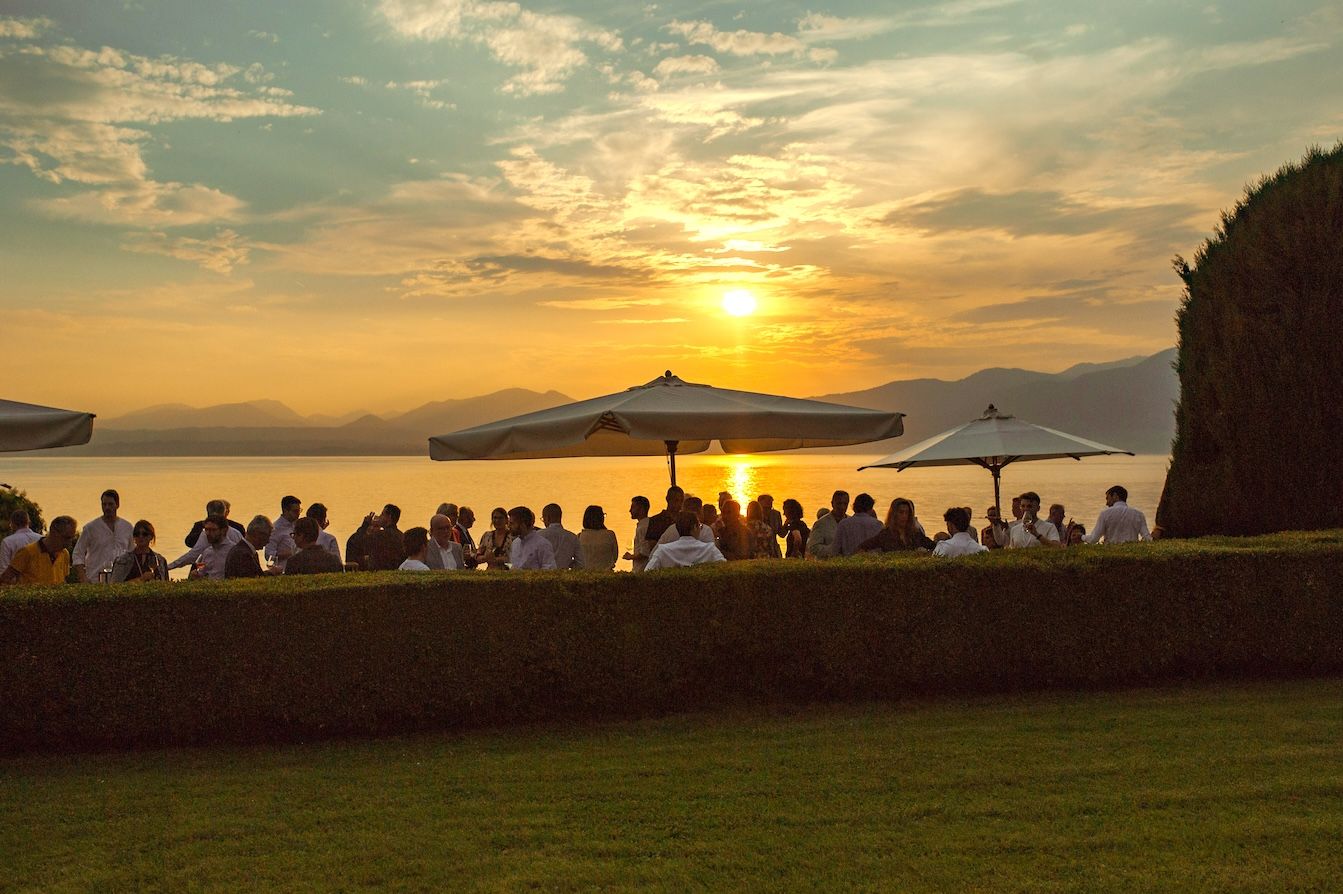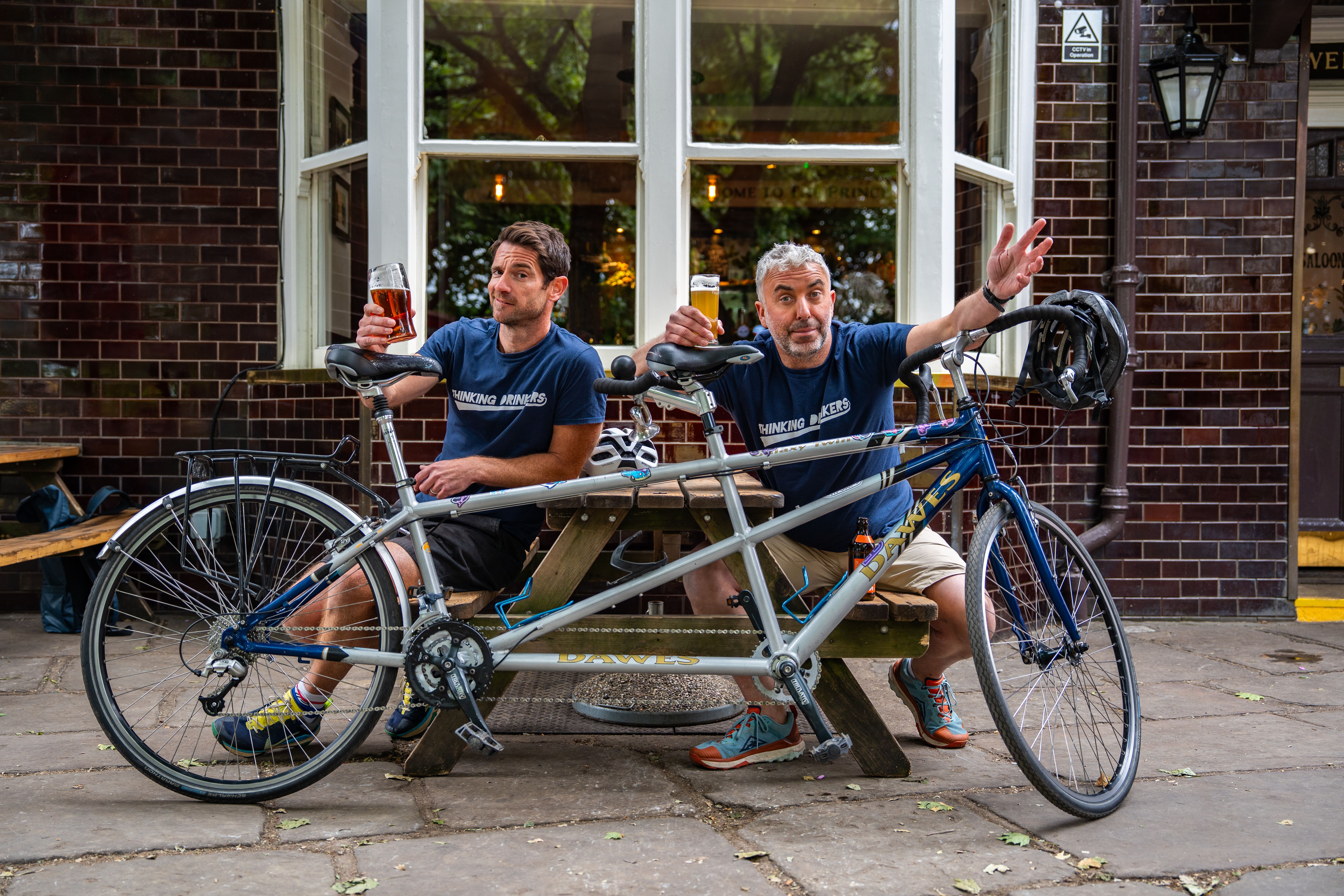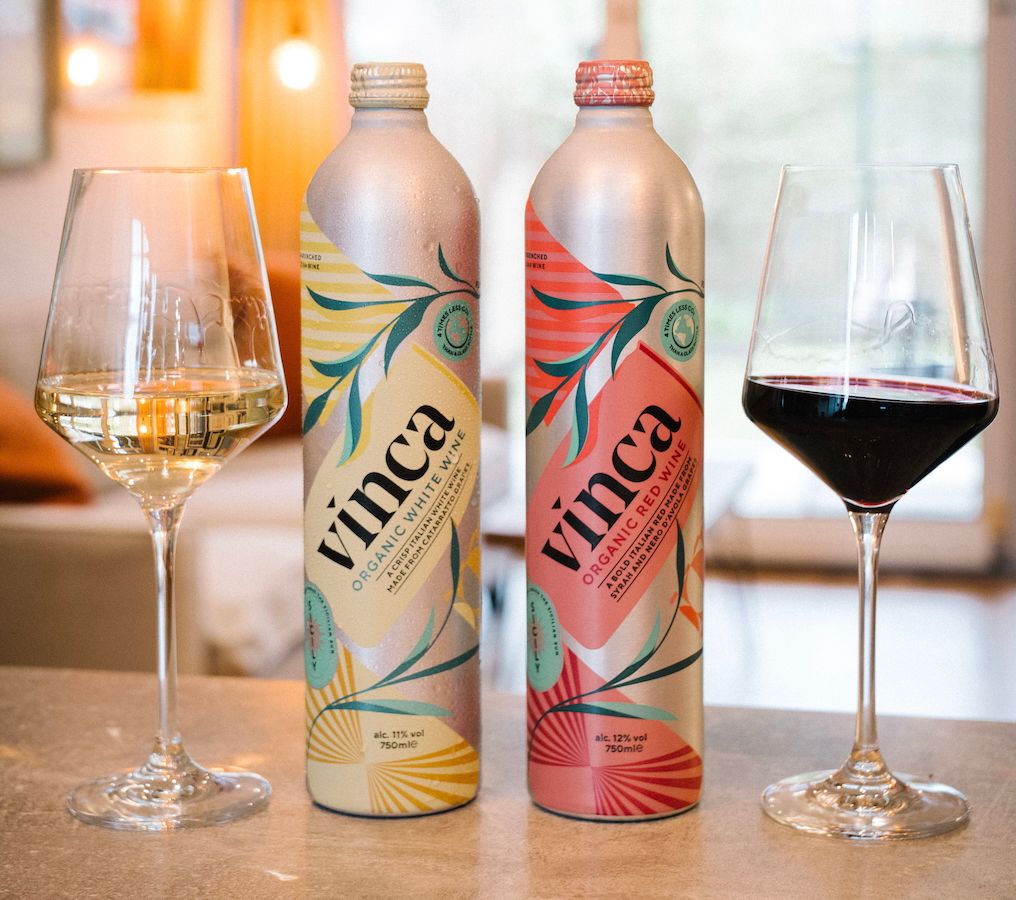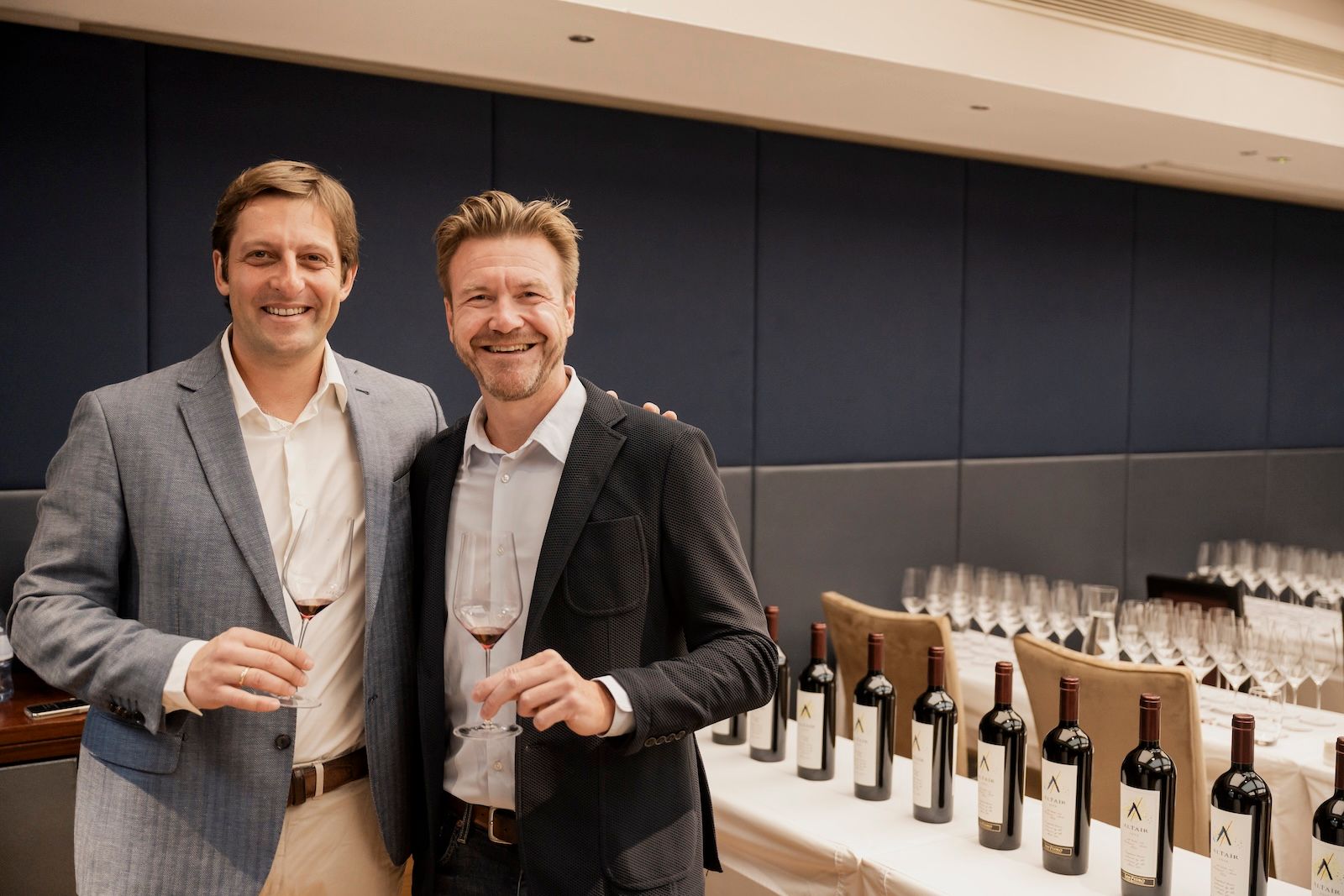“Some Champagne houses have seen the potential of our wines but there is an arrogance borne out of generations of dominance of the sparkling wine world that will not be changed easily,” says Rice.
I have known Emma Rice for many years and Hattingley Valley Wines was always an important listing on our wine list at The Harrow at Little Bedwyn, being privileged to be one of the first restaurants to list her Kings Cuvée. In fact, Tom Stevenson the acclaimed Champagne guru, author and founder of The Champagne and Sparkling Wine World Championships states that “Hattingley’s success is, without doubt, down to the humble and unassuming, but amazingly competent and talented winemaker, Emma Rice.”
I caught up with Emma online on account of current travel restrictions.
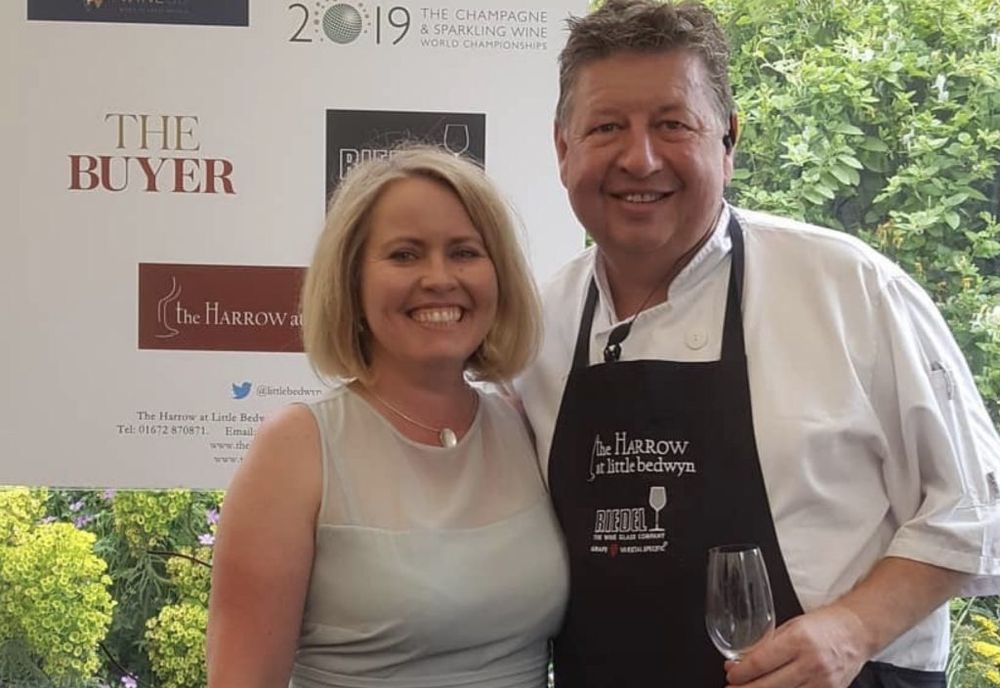
When Roger met Emma (in the flesh) at The Harrow at Little Bedwyn
I believe that your first inspiration as a young girl into the world of Champagne was trying Vintage Krug with your Grandfather
Not quite true. I was working at the White Horse Inn, Chilgrove when I was a teenager. I was 19 years old when they celebrated the 25th anniversary of the opening of the restaurant. The owners had invited various wine trade luminaries such as Jancis Robinson, Michael Broadbent, Hugh Johnson and others for a dinner, to be accompanied by some gems from the restaurant cellars. The aperitif was Krug 1979 from a double magnum. The owner said I could try it if there was any left, after I had poured for the guests. Of course, I made sure there was, the taste of that wine remains with me until this day. (My grandfather rarely ever drank wine – I don’t think I ever saw him drink more than a small sherry at Christmas!).
Having been working at the White Horse since I was 15 years old, I had already developed a fascination with fine wine, and this just cemented my desire to make my living somehow from the industry.
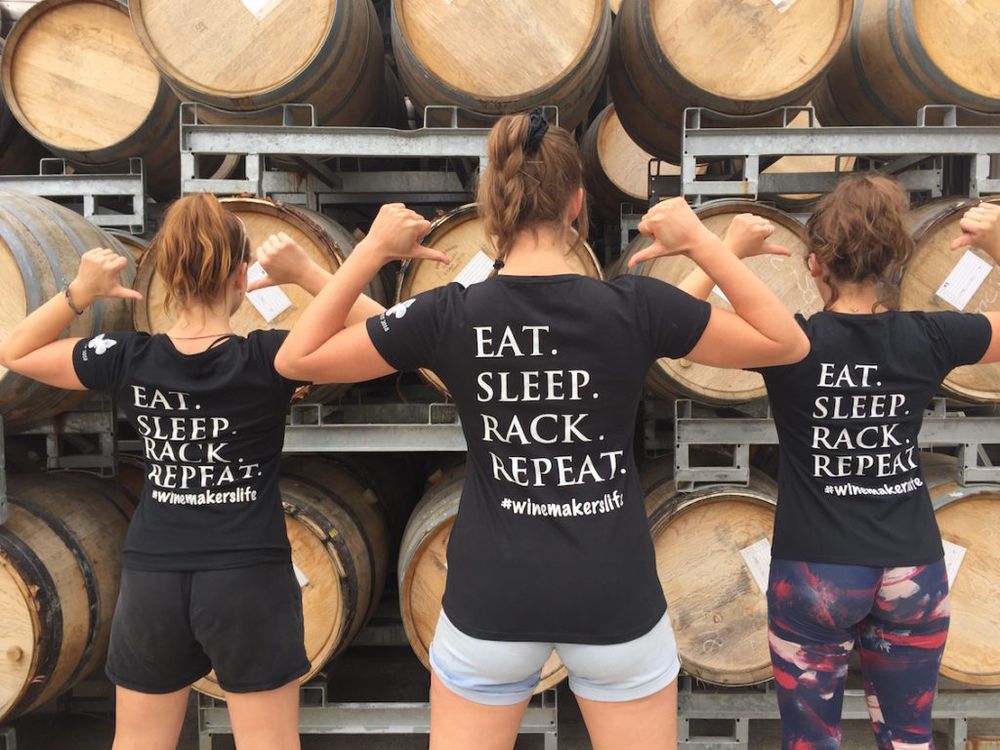
“Simon has always believed in investing in his staff and we have always got at least one person studying part-time at Plumpton or the WSET.”
Did this lay the groundwork for producing your premium wine Hattingley Kings Cuvée?
The Kings Cuvée was a happy accident in the first vintage, 2010. I had always wanted to work with barrels (thanks to Champagnes like Krug which use oak in their base winemaking), and we had quite a large proportion of oak barrels from the get-go. Our first ever vintage gave us a very small volume of grapes from our home vineyard, which I wanted to keep separate. A barrel was the perfect size to do this. It was only later on that we realised how good this wine was and the idea for Kings Cuvée was born.
I know that you were the first person to gain a BSc at Plumpton in Viticulture and Oenology And prior to that you were a PA at a wine importer then wine editor for Hugh Johnson… what did you do at university? drink ?
I was part of the first cohort of six to graduate in 2006 with a full BSc in Viti & Oeno at Plumpton, as a mature student. They had been doing courses for quite a few years before that, but under the title Biological Science (Wine Studies). I have always and pretty much only worked in the wine trade and I never made it to university first time round, so it could be argued that yes, I spent my late teens and twenties drinking…. My first full time job in London was for Domaine Direct, a Burgundy specialist, so my taste in wine was well out of my own budget! My housemates used to eagerly await my arrival home from work with the latest crop of ‘left-overs’ from the tastings at work.
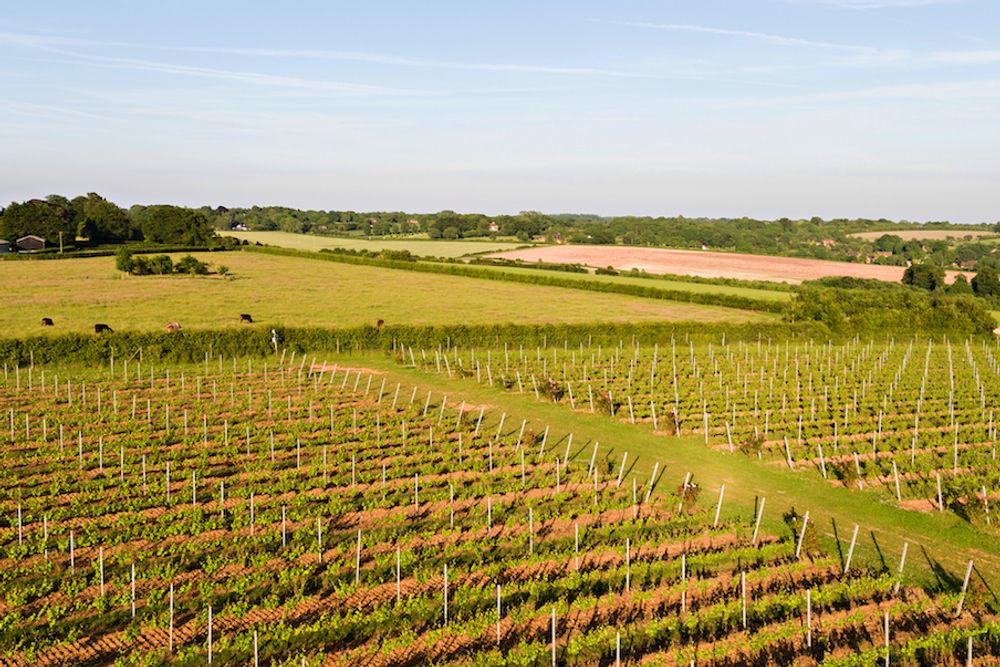
Hattingley Vineyard. There are no plans to plant more than its current 10.5 hectares.
Simon Robinson, the inspiring owner of Hattingley, planted his first vines in 2008 (by a German guy Ernst Weiss) and you joined at the end of 2008, other than this Hattingley is very much British both in flag waving and in attitude.
We have always been proudly British – we are not simply making a copy of Champagne. ‘British wine’ as a term has terrible connotations with the sickly and confected wines found on the bottom shelves of low-rent supermarkets, whilst English (or Welsh) wine is definitely in a class way above and separate. We find that in our biggest export markets (the USA and Australia, amongst others), the consumer doesn’t distinguish between English and British. There was a moment when I first went to Australia to launch our wines and one of the team at CellarHand (our agent there) said that in Australia “the ‘Brits’ are our cousins whilst the English are the bastards who beat us at cricket and rugby”.
We currently have a very international team in the winery, although we have also had lots of English workers coming through the ranks here. Simon has always believed in investing in his staff and we have always got at least one person studying part-time at Plumpton or the WSET. We also started the first Vintners Apprenticeship Scheme in partnership with the Vintners Company – we are onto our second apprentice, Andy Wiles, who is about halfway through his two-year programme. I was invited to become a Freeman of the Vintners Company earlier this year, which was a great honour.
You are also key to the export of British fizz to the Americans, and with your Blanc de Noirs both in the first class lounges and served in first class, do you often get upgraded to first to drink your own wine when travelling to New York ?
Ha ha! I have never been upgraded! Although I haven’t flown BA since the wine has been onboard so fingers crossed, when we are flying again maybe I’m in with a chance! The US is our biggest export market, and I think I would be right in saying that we are the most widely distributed English wine in the US. Gareth Maxwell, our commercial director, is the Chair of the WineGB Export Committee and is very active in engaging the US market not just for Hattingley but the wider industry.
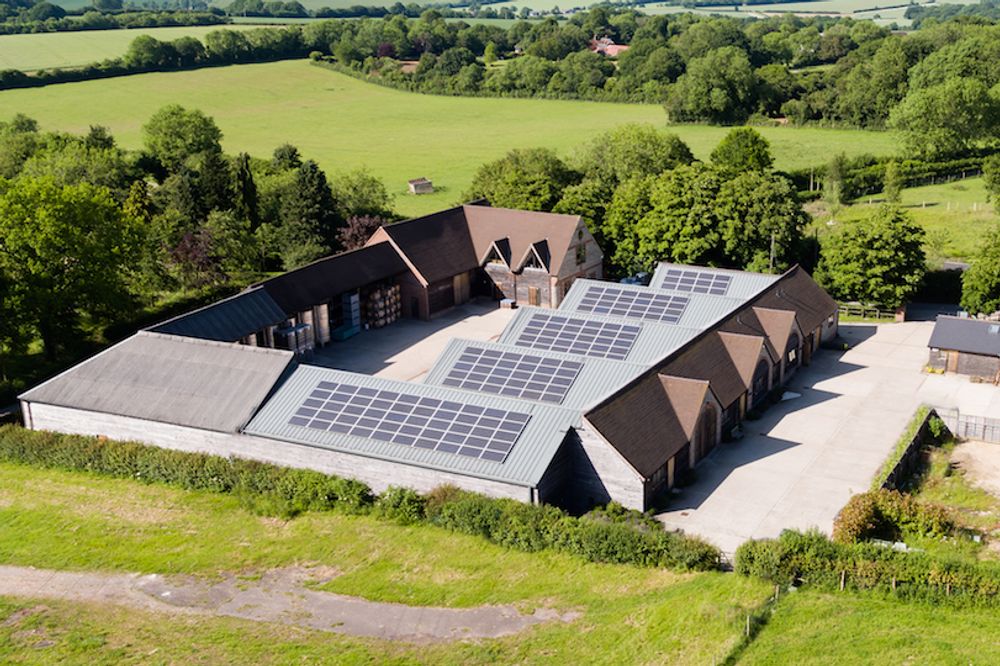
Hattingley Valley Estate. “I think the biggest threat to the industry is the naivety of too many of the new entrants into the industry. A lack of forethought beyond having a nice vineyard, means a possible over supply of grapes and not enough winery capacity to handle it.”
Besides America where else do you export to and what markets do you feel you have not touched yet?
Japan is looking like it will be a significant market. Australia is a small market but high-profile. The Scandanavian countries are also key and they are happy to spend money for high quality wine. Germany shows some promise, but they have a big domestic production of Sekt, that we just can’t compete with. As to where next, possibly Asia, countries such as Singapore. China is a tough nut to crack and even Champagne can struggle there.
You farm some 10.5 hectares – are there plans to expand this, you are of course heavily involved in contract wine making for so many British vineyards what percentage is this compared to the Hattingley bottling.
At the moment we see no need to invest in more planting. There are plenty of other people doing that – I must receive several calls a week from people who want to plant, have just planted, or planted three years ago and are only now thinking about where their harvest is going. Growing grapes is very risky. So is investing in one of the largest wineries in the UK. We have decided to let others take the risk on growing whilst we take the risk on the winery side of things.
We only take on vineyard partners who we trust and whose ability to grow quality fruit is assured. It also allows me a very wide palette of grapes from which I can blend my wines. I am not reliant on any one source or region, so when a frost event or other similar weather event occurs, we have a fighting chance of having good grapes available.
By sourcing from across the regions I also maximise the capacity of my winery. I can process about 40 tonnes per day. If Essex starts in late September and Hampshire finishes in late October, I can push my pressing capacity further than a winery taking fruit from one site or region.
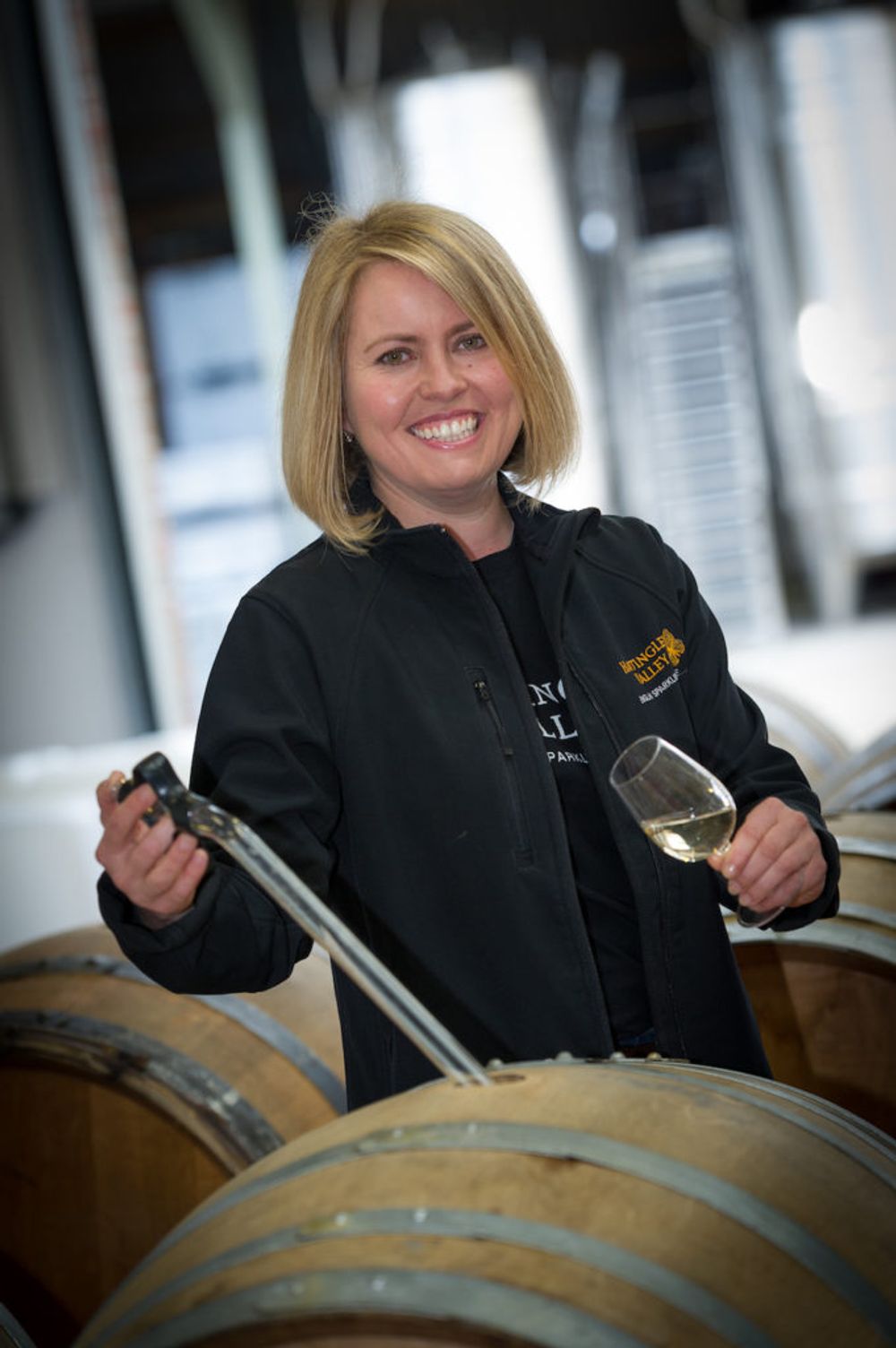
“We have the acidity profile some parts of Champagne can only dream of now.”
You have also been involved with Pommery. It must be good to advise the French on how to make sparkling wine!
Regarding Pommery – we act as a contract winemaker for them and have sourced fruit for them to make their wine at our winery. They send me their Champagne recipe, and I follow it. Sometimes concessions have to be made for the fact that we are not in Champagne and things can be a bit different here (namely access to the services that they take for granted, are simply not available here and we sometimes just have to manage with the kit we have).
Where do you see yourself and the British wine industry going in the next decade?
Until mid-March I would have said we as a brand were on a steep upward trajectory in terms of sales and new markets. Then we and our key on-trade customers hit the brick wall that is the global pandemic. We are optimistic that our key customers and markets will survive this, and we will pick things back up, but it might take us a little while to regain the momentum we had. Long-term, I see Hattingley established as the leading, prestige brand for English Sparkling, and a key innovator in new wine styles like our 100% Pinot Noir Precoce Rosé that we just released.
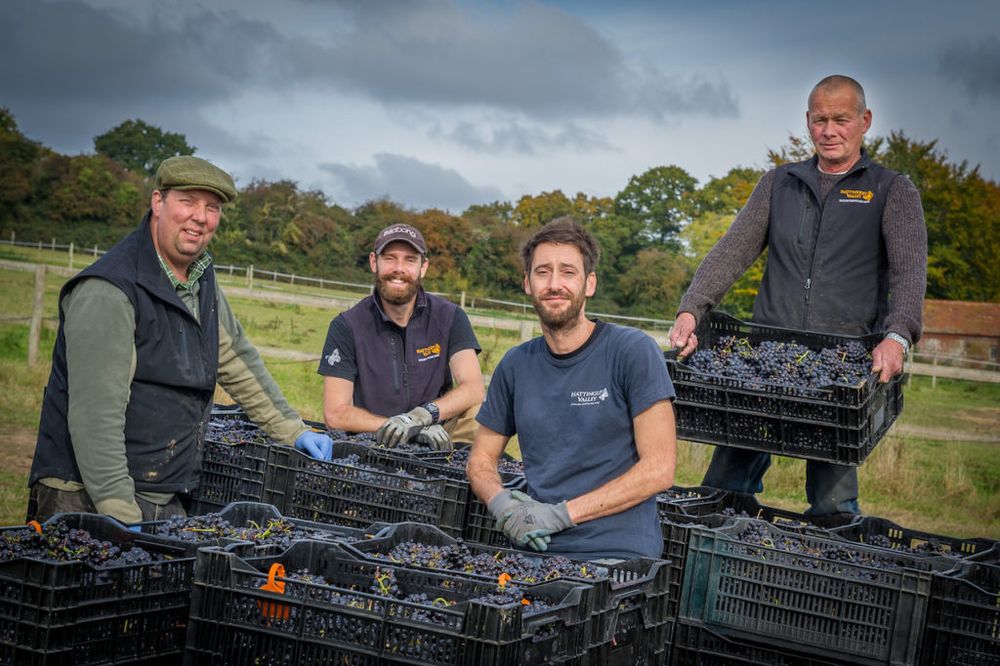
“Vast operations setting up across the south of England, with very aggressive business plans, may not be so focussed on quality as we are.”
I know you make a sweet still wines, are you looking into other still wines?
We have just released a new STILL by Hattingley range, starting with a 2019 Rosé –see above. At the same time, we bottled a red Pinot Noir from 2016 that had been in barrel for three years. It is being given a few months to settle in bottle and we hope to release it in the autumn. We have always said we will only make still wine if we think the quality justifies the price tag necessary.
Regarding the still Rosé, in 2019 we had a new vineyard come on stream and I had asked the grower to plant 5 acres of Precoce, to ensure supply for our sparkling Rosé. It did so well and was so ripe, and whilst fermenting in tank, it was so evocative of a Provencal Rosé, that I felt we had to let it shine by itself as a still wine. I am very happy with the result, and it is the perfect lockdown wine to drink in the garden in this sunshine – ideal with the new English asparagus now available.
How big can Hattingley evolve?
Our site in the village at Lower Wield has natural restrictions regarding our expansion. We are at around 600 tonnes maximum processing capacity – storage is the real bottleneck in terms of space. As far as I am concerned, this is about as big as I want to get and still be able to be involved in every parcel. This means we hope to be at around 500,000 bottles per year once running at full capacity.
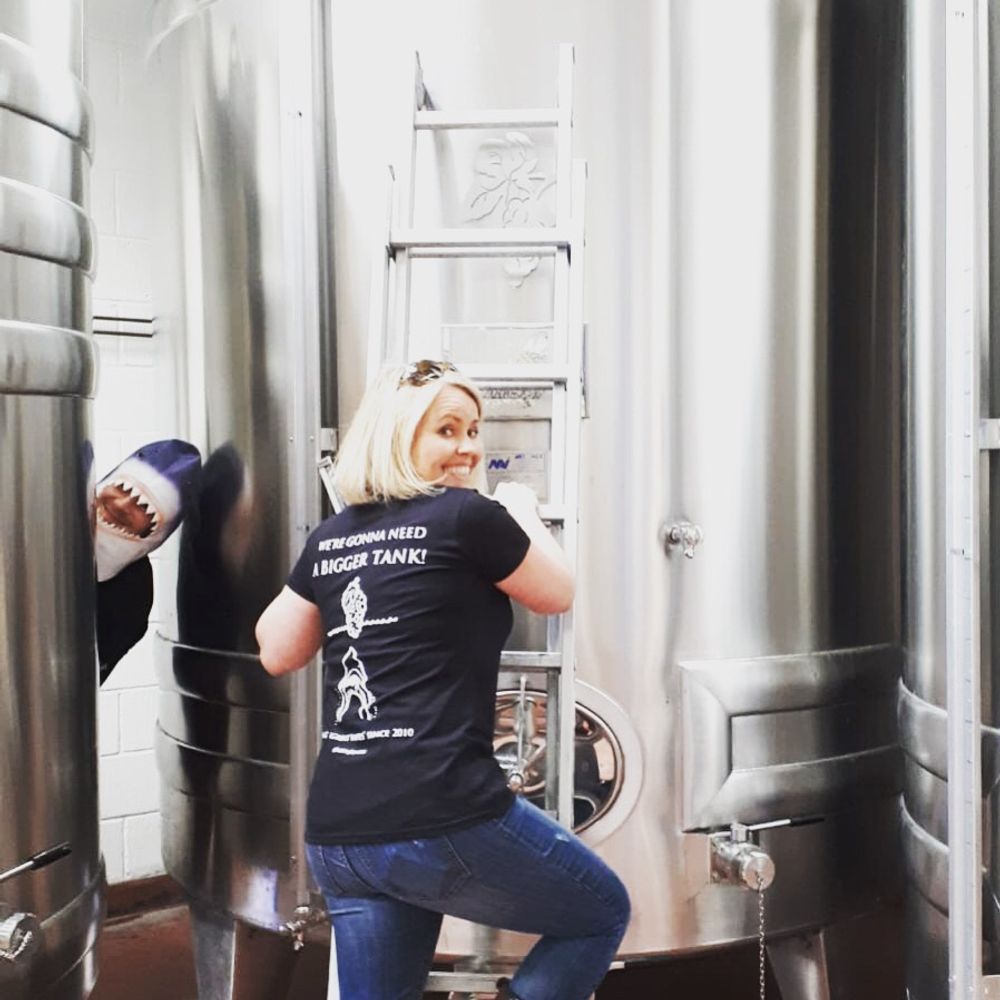
What challenges do you see ahead (away from Coronavirus)?
Over supply, without the necessary brand awareness work being done for the individual brands and for the category as a whole. I think the biggest threat to the industry is the naivety of too many of the new entrants into the industry. A lack of forethought beyond having a nice vineyard, means a possible over supply of grapes and not enough winery capacity to handle it. This means better grape prices for wineries like us, but it also means there might well be a huge backlog of stock sitting in cellars with no market for the ever-increasing volumes.
At the opposite end of the spectrum are the (relatively) vast operations setting up across the south of England, with very aggressive business plans, who may not be so focussed on quality as we are. For us, as Hattingley, the challenge continues to be how to engage the end consumer.
You have published the book on English Viticulture, you did do some training in California and Australia, have you done any in Champagne?
I have never actually worked in Champagne, but I do visit at least once if not twice each year. When I first set up my laboratory business in 2008, I was the UK agent for the Institut Oenologique de Champagne (IOC), a big laboratory and supplier of yeast and other winemaking sundries. I spent several vintages in Epernay shadowing one of their oenologists, Pierre-Yves Bournerias, around his patch in the Marne Valley. I have a great love for Pinot Meunier, the under-rated variety, ever since. I also worked under Jean-Manuel Jacquinot at Nyetimber back in 2004/5 and visit him regularly in Epernay.
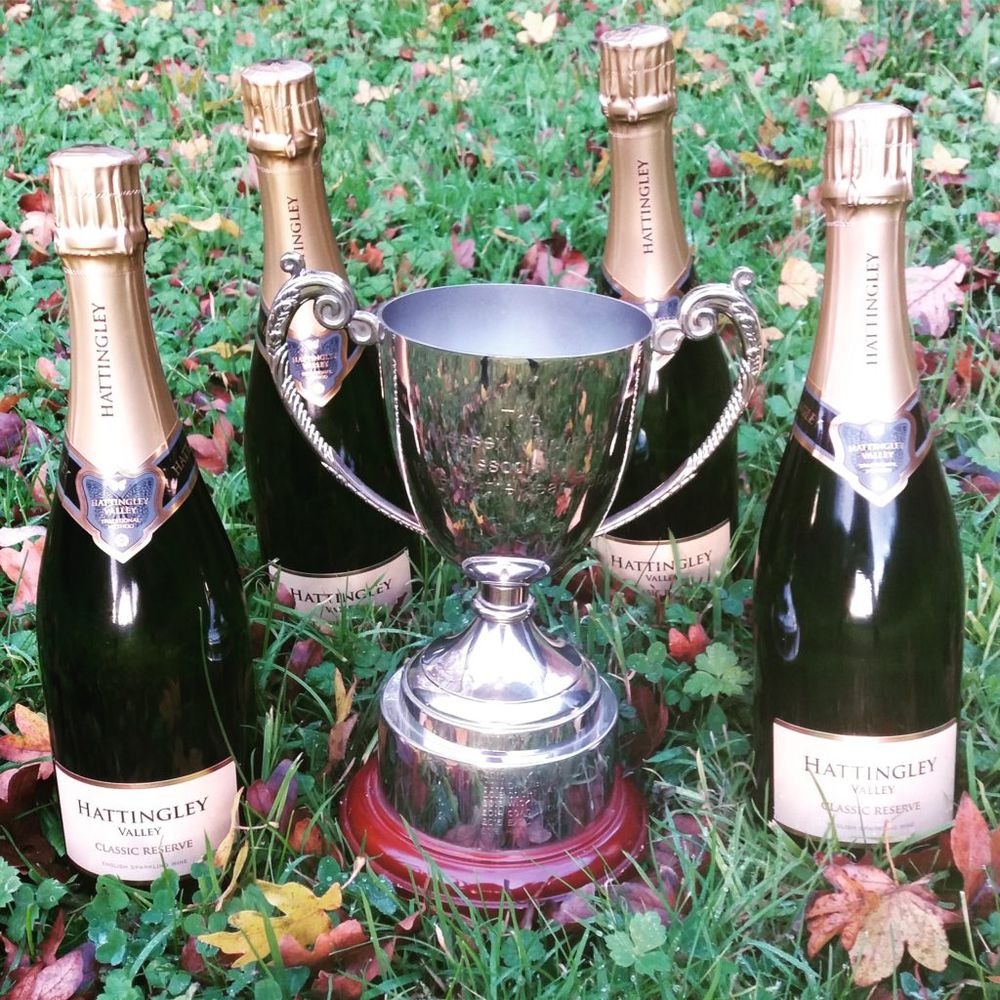
You have won a couple of awards at the Champagne and Sparkling Wine World Championships. How important is this competition to you? And how do you fit in with the famous Champagne winemakers that attend knowing that your wines are knocking them off their pedestals?
The CSWWC is the most important competition for me as a sparkling winemaker. To be judged alongside the very best sparkling wines in the world is the ultimate test and to win not just one trophy but two is such an accolade. Tom, Essi and Tony are the best palates to judge bubbles, and I was especially pleased that Tony was part of the panel that judged those World Champion winners in 2014 and 2017. He was a mentor and friend, and it was a big shock when he got ill and died so quickly last year. I hope that we can continue to win awards at the CSWWC going forward.
I still think that the Champenois are largely unaware and unbothered by English sparkling wine. We are seen as a novelty but no great threat. Some Champagne houses have seen the potential of our wines but there is an arrogance borne out of generations of dominance of the sparkling wine world that will not be changed easily. Climate change already sees us in the UK harvesting at what used to be a normal time in Champagne 30 years ago, whilst they are more often starting in August. And we have the acidity profile some parts of Champagne can only dream of now.
What’s the best food-match with your wines?
Honestly – fish and chips is great with the Classic and Kings! The Blanc de Blancs is absolutely ideal with seafood and fish with a rich sauce – the acidity cuts through it so well. And the sparkling Rosé is wonderful by itself, and with salmon, or with desserts like Eton Mess.
